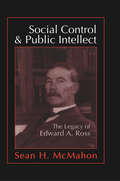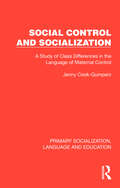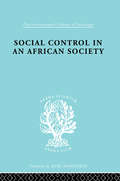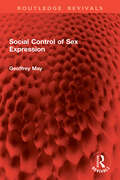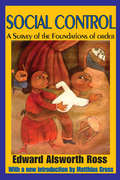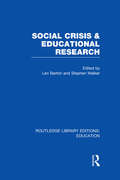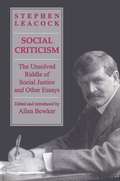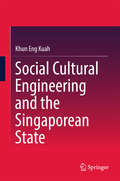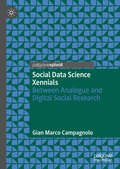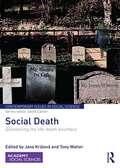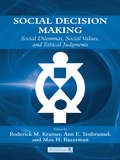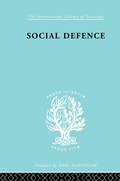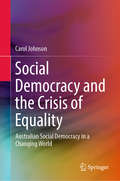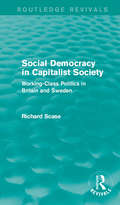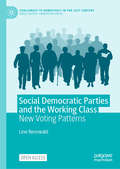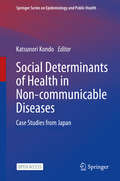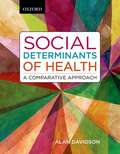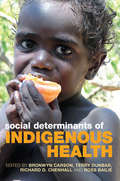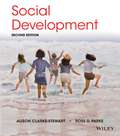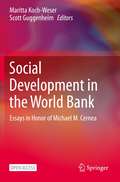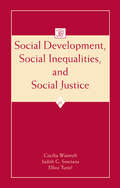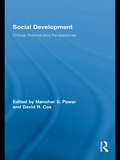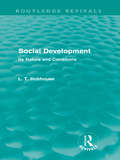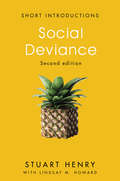- Table View
- List View
Social Control and Public Intellect: The Legacy of Edward A.Ross
by Sean McMahonAs the last presumptive founder of American sociology, Edward Alsworth Ross (1866û1951) was the first to secure its place in public discourse. Originally an economist who strongly criticized monopolies, Ross sought answers to the larger social issues of his day. His theory of social control helped to unify sociology into an independent discipline and elevate social research into an academic necessity. He implored sociologists to explain those social forces that unified people into sustainable groups. This first full analysis of Ross's intellectual legacy uses new sources to explore more broadly the scope of his influence.Throughout his career, Ross remained a controversial figure. Strong critiques of monopolies and immigration led to his dismissal from Stanford in 1900 in a landmark academic freedom case. Never satisfied with qualitative research, Ross traveled the world in search of social changes which he reported back to the American public. A 1910 trip to China yielded profound conclusions on the American economy and on the status of women. As one of the first observers of revolutionary Russia, Ross emerged at once critical of socialism and confident in the American system. Moreover, his articles reached a wide audience to demonstrate the usefulness and scope of American sociology. As Ross gained public favor, however, his academic reputation waned. By the 1920s he was left in the wake of quantitative scholarship. His concept of social control continued to engage academic theorists while new applications emerged in industrial management. After his death, scholars have debated new meanings of social control even as the disciplines of history and sociology have fragmented.In offering this examination of Ross's thought, McMahon draws on new primary materials, including interviews, to recreate the controversies that surrounded his career. The depths of his pursuits have never been so fully explored, and this new look at Ross places him among the giants of American intellectual life. Social Control and Public Intellect will be of interest to sociologists, historians, and American studies specialists.
Social Control and Socialization: A Study of Class Differences in the Language of Maternal Control (Primary Socialization, Language and Education)
by Jenny Cook-GumperzBasil Bernstein’s theory of social control was the foundation for this pioneer study of the language mothers use to socialize their children, and how it affects their understanding of social values and social attitudes as they grow older.Originally published in 1973, Dr Cook-Gumperz’s research was particularly important in that it made use of analytical methods which could measure numerically the manifestations of the three kinds of control – imperative, positional, personal – that Bernstein distinguished. Using the coding grid developed by Professor Bernstein and herself, Jenny Cook-Gumperz demonstrates clearly the relations between maternal class, maternal approach to discipline and the child’s progress. By showing that the effects of early upbringing on the educational potential of children were measurable, this significant work in the comparatively new field of sociolinguistics would form a basis for the methodological approach to further practical investigations of a similar nature at the time. Today it can be read in its historical context.
Social Control in an African Society: A Study Of The Arusha: Agricultural Masai Of Northern Tanganyika. African Studies Program, Boston University; 95 (International Library of Sociology)
by P. H. GulliverThis is Volume XV of eighteen in a series on the Sociology of Development. Originally published in 1963, this is a study of the Arusha people, the Agricultural Masai of Northern Tanganyika in Africa.
Social Control of Sex Expression (Routledge Revivals)
by Geoffrey MayFirst published in 1930, Social Control of Sex Expression is a study of the control exercised by Anglo American law over voluntary sex expression. Divided into three parts the book starts with the doctrine of sex repression among primitive peoples, among the ancient Hebrews and early Christians. It then explores the doctrine in English law and the problems of sexual morality and temporal jurisdiction in the second part. The last and final part looks at the doctrine in Anglo American law from pre-revolutionary America to America today.Two facts standout in relief from this study. The one is, that the methods of legal control of sex expression have varied widely throughout Anglo-American history. The other is, that the attitude behind the law, the doctrine of sexual morality itself, has varied not at all. The author argues that though the forms of control have changed, the fact of control, less tangible, still persists. This is an interesting read for scholars and researchers of sociology, law and psychology.
Social Control of Sex Offenders
by D. Richard LawsThis book surveys the history, current status, and critical issues regarding the various mechanisms designed to control sex offenders. It shows that the social problem of sex offending is not apparently resolvable by any of the means currently employed. A large array of procedures are used in the attempt to control the difficult population of sex offenders, including: imprisonment, institutional and community treatment, community monitoring by probation and parole, electronic monitoring, registration as a sex offender, community notification of an offender's status, strict limits on behavioral movement in the community, and residence restrictions. However, these constraints on behavior are almost completely the result of public outrage regarding sensational sex crimes, overreaction of media coverage that produce inaccurate statements of potential community risk, and the efforts of the legal profession and politicians to quell this anger and foreboding by enacting legislation that supposedly confronts the risk. This book demonstrates that we have constructed a massive edifice of community control that is socially and politically driven and which has largely failed to contain sex crime.
Social Control: A Survey of the Foundations of Order
by Edward Alsworth RossSocial Control falls within social psychology, which is the branch of knowledge that deals with the psychic interplay between man and his environment. In Ross' terms, one of these branches, social ascendency, deals with the domination of society over the individual. Another, individual ascendency, embraces such topics as invention, leadership, the role of great men, and deals with the domination of the individual over society.Social ascendency is divided into social infl uence-- mob mind, fashion, convention, custom, public opinion, and the like--and social control. Th e former is occupied with social domination that is without intention or purpose. The latter is concerned with social domination that is intended and that fulfi ls a function in the life of society. At the start of the twentieth century this work played an important role in the origination of social psychology as a distinct field.Ross sought to determine how far the order we see about us is due to infl uences that reach men and women without social intervention. Investigation shows that the personality freely unfolds under conditions of healthy fellowship and may arrive at goodness on its own, and that order is explained partly by this streak in human nature and partly by the infl uence of social surroundings. Ross' book separates the individual's contribution to social order from that of society, and, brings to light everything that is considered in the social contribution of the individual. Th is classic volume is an important contribution to the history of ideas.
Social Crisis and Educational Research (Routledge Library Editions: Education)
by Stephen Walker Len BartonOriginally written at a time of crisis in the education system of Britain – occasioned by cuts, contradictions and change - many of the issues discussed in this book are still relevant today. Debate in the book focuses upon an examination of the nature of the crisis, an exploration of the impact of the crisis upon school processes and upon the relationship between life in school and in the wider community, an investigation of the responses being made by pupils, teachers and educationalists to the day-to-day manifestations of the crisis and a consideration of how the current crisis is giving a particular poignancy to issues to do with the theories and methods employed in our study and interpretation of contemporary educational processes.
Social Criticism: The Unsolved Riddle of Social Justice and Other Essays (The Royal Society of Canada Special Publications)
by Stephen Leacock Alan BowkerStephen Leacock, long celebrated as Canada's foremost humorist and social satirist, has received little recognition for his considerable accomplishments as a serious thinker and social critic. In fact, Leacock was a professor of political economy, and more than half of his writings addressed the pressing issues of his day. This volume represents the neglected aspect of Leacock's career, gathering together his writings on a range of subjects, including imperialism, education and culture, religion and morality, feminism, prohibition, and social justice.The collection begins with 'Greater Canada: an appeal,' which dates from 1907, when Leacock was a popular lecturer advancing the cause of imperialism. Bowker points out that, for Leacock, imperialism was more a spiritual mission than a political agenda, representing the opportunity to unite Canadians, to inspire allegiance to a lofty tradition, and thereby to combat the threat of materialism, urbanism, fragmentation, and continentalism. These themes resurface in subsequent essays, culminating in The Unsolved Riddle of Social Justice, which was published in 1920. Carefully selected, and prefaced with an updated introduction to Leacock's life and work, these essays contribute to our understanding of Leacock and illuminate his role as a major figure in Canadian intellectual history.
Social Cultural Engineering and the Singaporean State
by Khun Eng KuahThis book, a collection of previously published articles, focuses on the role of the Singaporean State in social cultural engineering. It deals with the relationship between the Singaporean state and local agencies and how the latter negotiated with the state to establish an acceptable framework for social cultural engineering to proceed. The book also highlights the tensions and conflicts that occurred during this process. The various chapters examine how the Singaporean state used polices and regulatory control to conserve and maintain ethno-cultural and ethno-religious landscapes, develop a moral education system and how the treatment of women and its morality came into alignment with the values that the state espoused upon from the 1980s through the 1990s.
Social Data Science Xennials: Between Analogue and Digital Social Research
by Gian Marco CampagnoloThis book explores the tension between analogue and digital as part of an evolving research programme and focuses on the sequencing of methods within it. The book will be an invaluable reference for scholars who routinely engage in critical sociological analysis of the digital workplace and find it easier to treat the digital as an object of study. It describes how the transformations taking place in the 10-year arc of a career spent doing fieldwork in the IT sector led the author to progressively embrace new forms of data and methods. In a time where sociological imagination takes the shape of whatever new phenomenon can be studied by transactional data and machine learning methods, it is a reminder that longstanding engagement with a particular field of practice is the basis of empirical social science expertise. ‘This short book by Gian Marco Campagnolo is remarkably wide-ranging. It draws on theoretical perspectives as varied as Harold Garfinkel’s ethnomethodology and Andrew Abbott’s ‘linked ecologies’ to discuss topics as diverse as the adoption of packaged enterprise software in the public sector in Italy and the careers of often influential industry analysts. Campagnolo’s methods are primarily qualitative and ethnographic, but he shows a proper appreciation for quantitative methods such as text mining and sequence analysis. The book ends with a discussion of the famously difficult issue of achieving ‘explainability’ in machine learning. Campagnolo tantalisingly suggests the usefulness here of how ethnomethodologists view ‘accountability’: as a practical accomplishment that is hampered, rather than fostered, by efforts to give full explanations.’ —Donald MacKenzie, Professor of Sociology, Edinburgh University, Scotland‘The author adopts a ‘processual’ perspective on social data science as means of exploring and reflecting on the emergence of an academic career within this new domain of interdisciplinary inquiry. This is certainly a novel and interesting approach given the fact that ‘data science’ is work in progress and is characterized by a number of competing occupational groups that are struggling to define this emerging field.’—William Housley, Professor, University of Cardiff, UK‘Having myself written about the relationships between ethnography and computer science, I see this book as a timely contribution in that it extends the existing debate to data science. Data science is an emerging discipline that is gaining central stage in industry and in the public discourse. The aim of this book to indicate the importance of interdisciplinarity in this field is commendable.’—Giolo Fele, Professor, University of Trento, Italy'This book provides two entwined accounts: a reflective personal journey across different projects and methods and a grounded, genealogically sound analysis of the approaches and contributions of social science to understanding the digital society. These dual accounts are adroitly communicated. Their bold combination yields a unique and invaluable contribution to fundamental discussions in the social sciences, as well as an exemplar for how to combine ethnographic and data-driven analysis in a theoretically and epistemologically informed manner. With this book, Campagnolo brings us close to the methods and opens up an inspiring and challenging agenda for combining old and new forms of inquiry into sociological problems.' —Anne Beaulieu, Director Data Research Centre, University of Groningen, Netherlands
Social Death: Questioning the life-death boundary (Contemporary Issues in Social Science)
by Jana Králová and Tony WalterSocial death occurs when the social existence of a person or group ceases. With an individual, it can occur before or after physical death. Scholars in a wide range of disciplines have applied the concept to very diverse issues – including genocide, slavery, dementia, hospitalisation, and bereavement. Social death relates to social exclusion, social capital, social networks, social roles and social identity, but its theorising is not united – scholars in one field are often unaware of its use in other fields. This is the first book to bring a range of perspectives together in a pioneering effort to bring to the field conceptual clarity rooted in empirical data. Preceded by an original theoretical discussion of the concept of social death, contributions from the UK, Romania, Sweden, and Israel analyse the fourth age, end of life policies, dying alone at home, suicide, photographs on gravestones, bereavement, and the agency of dead musicians. This book was originally published as a special issue of Contemporary Social Science.
Social Decision Making: Social Dilemmas, Social Values, and Ethical Judgments (Organization and Management Series)
by Max H. Bazerman Ann E. Tenbrunsel Roderick M. KramerThis book, in honor of David Messick, is about social decisions and the role cooperation plays in social life. Noted contributors who worked with Dave over the years will discuss their work in social judgment, decision making and ethics which was so important to Dave. The book offers a unique and valuable contribution to the fields of social psychology and organizational behavior. Ethical decision making, a central focus of this volume, is highly relevant to current scholarship and research in both disciplines. The volume will be suitable for graduate level courses in organizational behavior, social psychology, business ethics, and sociology.
Social Defence Ils 212 (International Library of Sociology)
by Marc AncelFirst published in 1998. Routledge is an imprint of Taylor & Francis, an informa company.
Social Democracy and the Crisis of Equality: Australian Social Democracy in a Changing World
by Carol JohnsonThis book analyses social democratic parties’ attempts to tackle inequality in increasingly challenging times. It provides a distinctive contribution to the literature on the so-called ‘crisis’ of social democracy by exploring the role of equality policy in this crisis. While the main focus is on analysing Australian Labor governments, examples are also given from a wide range of parties internationally.The book traces how a traditional focus on class has expanded to include other forms of inequality, including issues of gender, race, ethnicity and sexuality and explores both the intersections and potential tensions that result. Meanwhile there are new challenges for equality policy arising from a changing geo-economics (the rise of Asia), the legacies of neoliberalism and the impact of technological disruption.
Social Democracy in Capitalist Society (Routledge Revivals): Working-Class Politics in Britain and Sweden
by Richard ScaseFirst published in 1977. This book considers the nature of industrial society, contemporary capitalism and the impact of political ideas on social structure. These ideas are discussed by reference to the impact of social democracy on the structure of capitalist society in a comparative analysis of Britain and Sweden — including an interview survey of industrial workers socio-political attitudes. The study is concluded by a general discussion of the role of social democracy in capitalist society. It is argued that the development of social democracy generates ‘strains’ which, in the long term, question the legitimacy of capitalism among industrial manual workers.
Social Democratic Parties and the Working Class: New Voting Patterns (Challenges to Democracy in the 21st Century)
by Line RennwaldThis open access book carefully explores the relationship between social democracy and its working-class electorate in Western Europe. Relying on different indicators, it demonstrates an important transformation in the class basis of social democracy. At the beginning of the twenty-first century, the working-class vote is strongly fragmented and social democratic parties face competition on multiple fronts for their core electorate – and not only from radical right parties. Starting from a reflection on ‘working-class parties’ and using a sophisticated class schema, the book paints a nuanced and diversified picture of the trajectory of social democracy that goes beyond a simple shift from working-class to middle-class parties. Following a detailed description, the book reviews possible explanations of workers' new voting patterns and emphasizes the crucial changes in parties' ideologies. It closes with a discussion on the role of the working class in social democracy's future electoral strategies.
Social Determinants of Health in Non-communicable Diseases: Case Studies from Japan (Springer Series on Epidemiology and Public Health)
by Katsunori KondoThis book is open access under a CC BY-NC-ND 4.0 license.This open access book is the first compilation that reviews a wide range of social determinants of health (SDHs) for non-communicable diseases (NCDs) and healthy ageing in Japan. With the highest life expectancy and the largest elderly population in the world, Japan has witnessed health inequality by region and social class becoming more prevalent since the 2000s. The first half of this volume describes in detail major NCDs, such as cancers, heart and kidney diseases, diabetes, stroke, and metabolic syndrome. The second half, on the other hand, explores various SDHs relating to healthy ageing. All chapters review and focus on SDHs, particularly health inequality associated with socio-economic status and social capital, which are widely addressed in the field of social epidemiology. The book makes the argument that “Health for All” advocated by the WHO should be implemented based on social justice and benefits for the greater society. Public health researchers and policymakers, both in Japan and other nations, will gain scientific evidence from this book to prepare for the coming era as ageing becomes a global issue.
Social Determinants of Health: A Comparative Approach
by Alan Davidson<p>Social Determinants of Health: A Comparative Approach introduces the various elements that determine the health of individuals in their communities. The text takes a macro-level approach, focusing on population health rather than strictly on individual health. Social Determinants of Health focuses on "Anglo-American" countries-Canada, the United States, the United Kingdom, and Australia-examining the commonalities and differences socially, economically, and politically. <p>The text begins by outlining the background, theory, and evidence for a population health perspective. This is followed by discussion of environmental factors, such as employment, housing, and diet, and social factors such as gender, support and well-being, and being an Aboriginal person. The text concludes with an overview of the social patterning of health-relevant behaviour and the politics of health-related policy. Written in an accessible manner, Social Determinants of Health further engages students by offering case studies and "Pause and Reflect" boxes, as well as end-of-chapter questions, suggested readings, and websites.</p>
Social Determinants of Indigenous Health
by Bronwyn Carson Terry Dunbar Richard D. Chenhall Ross BailieThe opportunities and comfortable lifestyle available to most Australians have been denied to generations of Indigenous people. As a result some of Australia's original inhabitants suffer from what has been described as 'Fourth World' standards of health. This is out of place in a country that prides itself on egalitarianism and a fair go for all.Shifting the focus from individual behaviour, to the social and political circumstances that influence people's lives and ultimately their health, helps us to understand the origins of poor health. It can also guide action to bring about change. Social Determinants of Indigenous Health offers a systematic overview of the relationship between the social and political environment and health.Highly respected contributors from around Australia examine the long-term health impacts of the Indigenous experience of dispossession, colonial rule and racism. They also explore the role of factors such as poverty, class, community and social capital, education, employment and housing. They scrutinise the social dynamics of making policy for Indigenous Australians, and the interrelation between human rights and health. Finally, they outline a framework for effective health interventions, which take social factors into consideration.This is a groundbreaking work, developed in consultation with Indigenous health professionals and researchers. It is essential reading for anyone working in Indigenous health.
Social Development
by Alison Clarke-Stewart Ross D. ParkeSocial Development, 2nd Edition provides psychologists with a comprehensive, scholarly, engaging, and up-to-date treatment of theoretical insights and empirical findings in the field of social development. <P><P>It conveys the excitement of recent advances along with the accumulated knowledge that forms the basis of the field. Psychologists will gain a better understanding of cultural variation, both among societies around the world and within our own society.
Social Development in the World Bank: Essays in Honor of Michael M. Cernea
by Maritta Koch-Weser Scott GuggenheimThis open access book honors the work of Michael Cernea, who was the World Bank’s first professional sociologist, by taking on and extending his arguments for "putting people first.” Cernea led a community of social scientists in formulating and promoting a comprehensive set of innovative and original social policies on development issues, which the World Bank adopted and implemented. This book includes globally significant work on urban and rural development, the epistemology of using social science knowledge in national and international development, methodologies for using social organization for more effective poverty reduction, and the experience of crafting social policies to become normative frameworks for purposive collective social action. And by including contributions from senior policy makers in the World Bank who helped shepherd social science's entry into development policy and practice, it provides a unique look at how organizational change can happen.
Social Development, Social Inequalities, and Social Justice (Jean Piaget Symposia Ser.)
by Cecilia Wainryb Judith G. Smetana Elliot TurielThis volume considers previously separate bodies of research on social justice, social equality, and social development. Eminent scholars from a variety of disciplines discuss the latest research to help us understand the relation between social inequalities and social development. In so doing, the book documents the powerful ways that social inequ
Social Development: Critical Themes and Perspectives (Routledge Studies in Development and Society)
by Manohar S. PawarThis edited collection demonstrates that the ideas inherent in social development are practical and not utopian. By discussing and delineating a social development approach, the book argues the need for practicing it at local or grassroots-level communities to promote universal social justice and wellbeing. Towards this end, several leading scholars have presented critical and inspiring thoughts on the significance and usefulness in development of genuine participation of people, bottom-up strategies, self-reliance, capacity building, and egalitarian and empowering partnerships. They also delve into hitherto neglected aspects of social development related to preparing personnel for social development work, ethical imperatives and a new social development paradigm. The world’s contemporary problems persist in part because the social development approach in its comprehensive form has not been planned and implemented at local, national and global levels. Social Development presents the optimistic argument that the application of social development ideas can help create a world in which almost all people’s wellbeing can be significantly enhanced.
Social Development: Its Nature and Conditions (Routledge Revivals)
by L. T. HobhouseOriginally published in 1924, Professor Hobhouse's theories and commentaries upon social development are an important milestone in the history of sociological thought. Of particular interest to the modern sociologist is his delineation of the struggle of the human mind towards rationality in thought and action and his insistence on the principle that in all social investigations it is necessary to distinguish between questions of fact and questions of value.
Social Deviance (Short Introductions)
by Stuart HenryThe new edition of this popular introduction explores the meaning of social deviance in contemporary society. It traces the path by which we create deviance: how we single out behavior, ideas, and appearances that differ from the “norm,” label them as either offensive or acceptable, and then condemn or celebrate them. The book explains what kinds of behavior are banned and who bans them, exposing the important political influences underlying these processes. Refreshed with a new engaging, accessible style, the second edition features expanded treatment of the theories of deviance, new material on positive deviance, and updated references and contemporary examples throughout. At its core, Social Deviance looks at who becomes deviant and why. It delves into the multiple motives that cause rule-breakers to behave badly in the eyes of those they offend or creatively in the eyes of those they please, and it reveals the way deviants think about their actions, their moral identity, and their fellow moral outcasts.
